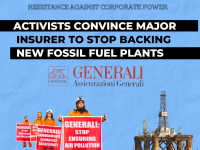Activists Convince Major Insurer to Stop Backing New Fossil Fuel Plants

Photos: Francesco Alesi/Greenpeace, Steven Straiton.
Assicurazioni Generali S.p.A., one of the world’s largest insurance companies, pledged not to provide insurance to “transition laggards” (companies that are failing to tackle global warming) for new fossil fuel terminals and power plants, in response to a campaign by activist groups like Greenpeace, InsureOurFuture and ReCommon in Italy.
“Generali’s move is a clear signal to the market that long-term risks associated with oil & gas expansion have become too high. Italian financial institutions should recognise this and stop financing the new gas infrastructure of Italy’s fossil giant, Eni, in line with [the International Energy Agency’s] recommendation to keep global warming under 1.5°C.” – Antonio Tricarico from ReCommon
Generali
Founded in 1831 in Trieste, Italy, Assicurazioni Generali is among the world’s 20 largest insurance companies. In recent years, Generali has faced mounting criticism from NGOs for underwriting and investing in fossil fuel projects that contribute to climate change. For example, in 2018, the company estimated that it had €2 billion invested in coal projects alone.
Coal Campaign
Three groups - Akcja Demokracja, Greenpeace Italy and Unfriend Coal - collectively gathered over 90,000 signatures in 2018 calling on Generali to stop insuring coal projects in Poland (the most polluting country in Europe) such as the 4,061 megawatt Kozienice plant which was estimated to cause over 14,000 asthma attacks in children and as many as 650 premature deaths annually.
New Policy
In 2021, Generali published a new policy denying insurance to all fossil fuel companies that sourced over 20 percent of their income from coal. Analysts at Reclaim Finance described this as "heading in the right direction, but gaps remain,” but noted that the 20 percent clause allowed Generali to still provide insurance to 79 companies active in coal projects worldwide.
Oil & Gas
In 2022, Generali updated its policy again to say that it would stop insuring “upstream” (exploration and production) unconventional oil and gas projects, ie fracking and in the Arctic. The company said it would, however, continue to insure “midstream” (pipelines and shipping) projects in the Arctic, which is one of the most climate-vulnerable areas.
Partial Victory
In October 2024, Generali updated its policy once again to say that it would not to insure new midstream and “downstream” (refining and processing) oil and gas projects of companies deemed to be “transition laggards.” Activists applauded the move but noted that, once again, Generali had opened a loophole for companies that promise to achieve net-zero without guaranteeing actual change.
"Generali’s announcement is a step forward but it does not go far enough. It seems to think that a company developing new oil and gas projects can be in transition. But the science is clear. There is no room for new oil and gas projects if we want to preserve an insurable world." – Ariel Le Bourdonnec, Reclaim Finance insurance campaigner
Company response
"As a member of the Net-Zero Asset Owner Alliance, Generali is committed to gradually decarbonizing its investment portfolio in order to reach net-zero emissions by 2050." – Generali Climate Change Strategy Technical Note
This is #90 in our series of Instagram infographics on resistance against corporate power.
Click here to see the full post on Instagram.



